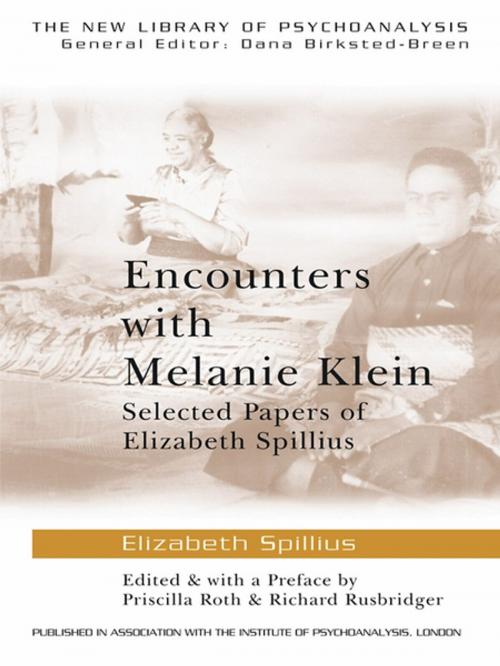Encounters with Melanie Klein
Selected Papers of Elizabeth Spillius
Nonfiction, Health & Well Being, Psychology, Psychoanalysis, Mental Health| Author: | Elizabeth Spillius | ISBN: | 9781134110841 |
| Publisher: | Taylor and Francis | Publication: | August 7, 2007 |
| Imprint: | Routledge | Language: | English |
| Author: | Elizabeth Spillius |
| ISBN: | 9781134110841 |
| Publisher: | Taylor and Francis |
| Publication: | August 7, 2007 |
| Imprint: | Routledge |
| Language: | English |
In Encounters with Melanie Klein: Selected Papers of Elizabeth Spillius the author argues that her two professions, anthropology and psychoanalysis, have much in common, and explains how her background in anthropology led her on to a profound involvement in psychoanalysis and her establishment as a leading figure amongst Kleinian analysts.
Spillius describes what she regards as the important features of Kleinian thought and discusses the research she has carried out in Melanie Klein's unpublished archive, including Klein's views on projective identification.
Spillius's own clinical ideas make up the last part of the book with papers on envy, phantasy, technique, the negative therapeutic reaction and otherness. Her writing has a clarity which is very particular to her; she conveys complicated ideas in a most straightforward manner, well illustrated with pertinent clinical material.
This book represents fifty years of the developing thought and scholarship of a talented and dedicated psychoanalyst.
In Encounters with Melanie Klein: Selected Papers of Elizabeth Spillius the author argues that her two professions, anthropology and psychoanalysis, have much in common, and explains how her background in anthropology led her on to a profound involvement in psychoanalysis and her establishment as a leading figure amongst Kleinian analysts.
Spillius describes what she regards as the important features of Kleinian thought and discusses the research she has carried out in Melanie Klein's unpublished archive, including Klein's views on projective identification.
Spillius's own clinical ideas make up the last part of the book with papers on envy, phantasy, technique, the negative therapeutic reaction and otherness. Her writing has a clarity which is very particular to her; she conveys complicated ideas in a most straightforward manner, well illustrated with pertinent clinical material.
This book represents fifty years of the developing thought and scholarship of a talented and dedicated psychoanalyst.















